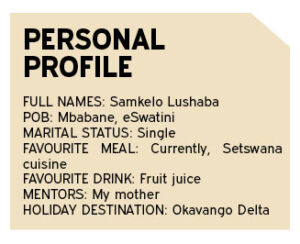Meet the boss
Established in 1974, Institute of Development Management (IDM) owes its existence to three famous leaders: Botswana’s founding President, Sir Seretse Khama, Lesotho’s King Moshoeshoe II and King Sobhuza II of Eswatini.
49 years later and the institute has evolved beyond all expectations.
A big player in the education and training industry, IDM boasts an impressive alumni that dominates high positions in both government and the private sector.
Taking us back to school, we meet Eswatini national, Samkelo Lushaba, who was appointed IDM Regional Director and Chief Executive back in March 2022.
-
Kindly introduce yourself.
I’m from Lobamba Lomdzala in Eswatini and I have Master of Business Administration (University of the Witwatersrand – SA and Emory University – USA); Bachelor of Science, Computer Science & Mathematics (University of Eswatini).
-
Take us through your journey before you joined IDM?
I have vast experience in Strategic Plan Development and execution, Business Process Re-engineering and Organizational Development. I joined IDM from the Small Enterprises Development Company (SEDCO), a wholly state-owned entity established to create, develop and promote Micro, Small and Medium Enterprises (MSMEs) in the Kingdom of Eswatini.
I served as the Capacity Development and Sector Support Executive. I was responsible for, among others: driving the development and delivery of capacity building interventions within the MSME Sector, strategy and policy development, as well as networking and coordination.
Prior to that, I worked as Principal Policy Analyst – ICT Governance and Compliance at the Private and Cabinet Office, leading the design and deployment of ICT policies and standards framework within the Government of Eswatini.
-
Wow, sounds like you had your hands full!
In the consultancy, research, training, and education sphere, I worked at the Eswatini Institute for Management & Public Administration for over 12 years, where I served as Head of ICT, Senior Lecturer and Lecturer respectively, providing: education, research, training and consultancy services to primarily, the Government of Eswatini and the private sector.
-
Fast forward to today – what is your role at IDM?
My primary role is to oversee the strategic direction of the Institute’s campuses in Botswana, Lesotho & Eswatini to deliver the IDM mandate of Training, Education, Research and Consultancy.
-
So how is IDM faring in the world of education?
IDM was initially established to meet the developmental needs mainly in the civil service of the Republic of Botswana, The Kingdoms of Lesotho and Eswatini when they had just attained independence and needed to close the skills gap.
The institute has developed and evolved over the years from focusing on short-term courses to long term programmes, transforming to provide courses targeted at other areas including the private sector and civil society.
The growth entailed accreditation of programmes in compliance with international training and qualifications framework. IDM programmes have evolved from Certificate to Masters Level. This transformation has facilitated IDM’s pronounced participation across, for instance, the management and leadership education pipeline.
-
IDM has a footprint in three countries, how do the campuses complement each other?
IDM is the only institution that still ties the three countries to one common agenda; and we are able to share resources amongst the three institutions to the benefit of one another. We even graduate our students under one roof through a joint graduation ceremony, which rotates around the three countries.
We are able to draw skills and experiences from one another as a tripartite and are now able to go beyond and collaborate with other countries beyond the tripartite; to share our experiences to the other territories and exchange knowledge.
-
What sets IDM apart from the rest?
We have built networks and collaborations with other institutions that span from the academia, the public sector to the private sector. The institution has placed these collaborations at the heart of its operations to ensure success in delivering its corporate strategy and ensuring relevance in terms of product offering.
If you look at IDM’s business model, our campuses in Botswana, Lesotho and Eswatini do not receive funding from our governments for our recurrent budget. We depend on governments only for funding through scholarships, but pay salaries and other development activities on our own.
In Botswana, we have become a benchmark, such that government constantly challenges other tertiary institutions to emulate this model to reduce dependency on government.
-
Indeed, government sponsorships have declined over the years – how are you coping?
When we developed our 2022-2027 Corporate Strategy, we were bold about growing other revenue income streams to provide significant relief and financial sustainability. Apart from the government sponsorships, IDM runs a fully-fledged Center for Continued Professional Development [in Serowe], through which we offer a wide range of short courses tailor-made to suit the needs of our customers.
In addition, we are mandated to provide consultancy and research work. Over the years, we have increased our participation in this area to increase our income revenue.
-
What would you say are some of IDM’s standout moments?
Some of our notable achievements include pioneering a sustainable business model that turned around our financial performance, ensuring increased revenue, profitability and improved business results.
We further positioned IDM local ranking of Tertiary Institutions from number 21 to Number 3 (Service Bridges Consulting – 2019) and increased brand reputation, brand affinity and market share in the three countries of Botswana, Lesotho and Eswatini.
We have managed to respond to the needs and requests of civil service to provide programmes such as Project Management which is pivotal to in-service delivery. In Eswatini and Lesotho, we were able to craft and introduce a Regional Health & Safety programme which led to us collaborating with entities in South Africa that offer the programme.
-
What challenges do you face?
Challenges present opportunities to continuously do better! When we crafted our 2022-2027 Corporate Strategy, several factors gave us insights to fulfill our mandate as an institution of higher learning.
1) Digital transformation: Investment in technology will help us to cater for the Millennials and Generation Z, who make up the majority of our customer base.
2) Changing job markets: Industries across the economies demand specialised skills and technical expertise. IDM is challenged to be up-to-speed in providing industry-responsive curricular to meet the demands of the job market.
3) Declining education budget: Over the years, governments have been reducing the education budget to address other competing responsibilities. Reliance on income from government sponsorships is thus detrimental to the financial health and survival of the Institute.
4) Public health pandemics: Covid-19 demonstrated its impactful might on our operations, hence the need to invest in Safety, Health and Environment measures and standards. Covid-19 has further prompted us to redefine our business model. Consequently, a major shift and focus has resulted in the Institute offering learning through blended learning, challenging us to move beyond the conventional brick and mortar model.
-
What difference has IDM brought to the local tertiary landscape?
IDM is home to students of different backgrounds on an economic level and culturally. While some come in fresh from high school, others are working; and a good number of them are long distance learners. We have developed convenient ways of reaching out to this different clientele, such as block release, where we offer lessons during weekends. We have enhanced our E-learning system for our students to be able to study flexible hours that fit into their schedules.
We provide for the working learner to enable them to study through evening classes, while the young, fresh from high school students attend full-time classes.
-
Any new developments from IDM we should look out for?
I am excited to share the strategic goals we want to pursue under our new strategy, underpinned by three strategic themes: Striving for Excellence; Enhancing Collaborations and Partnerships; and ensuring Good Governance prevails.
These goals are: excellence in teaching and learning: We will invest in digital transformation to facilitate interactive and student-centered modern learning methodologies. We will offer superior student experience by providing adequate resources and a social/intellectually challenging environment and build a strong local and international profile: We will leverage on our tripartite establishment to strengthen our local footprint and global institutional links.
-
There is confusion over whether IDM is a private or public institution, kindly clear the air on this.
IDM is a regional organisation in Botswana, Lesotho and Eswatini, established to help meet the management needs of the region through management development activities.
Its mandate includes education, training, research and consultancy. In each of the three countries, IDM is registered as a company. IDM operates under the general direction of a Governing Board composed of representatives from government, industry and universities in each of the three countries.
Botswana campus reports to the Office of the President; in Lesotho we report to the Ministry of Education, while in Eswatini we report to the Ministry of Public Service.
-
Form 5 results were released last week, any word for prospective students tempted to enroll with IDM?
I wish to congratulate all the O’Level classes of 2022. It wasn’t an easy journey, but they made it nonetheless. I would urge them to consider IDM as their Education and Training Partner of choice.
Our Botswana campus was recently certified on ISO 9001:2015 quality standard. Quality and relevance of programmes is assured. We have campuses in Francistown and Gaborone for ease of access. The institute has a robust e-Library platform that allows students full access to current academically credible e-books and e-journal articles.
IDM further offers secure and modern on-campus and off-campus accommodation facilities which is a critical component of learning. We also make a call to the in-service to apply for our upcoming July 2023 intake. We have flexible study modes and affordable fee structure for their consideration.
-
With regards to engaging with prospective students, what’s in for the students, any road shows in the pipeline?
We are happy that IDM is the driving force behind the tertiary institutions annual roadshows, which have been happening over the past nine years. We will definitely ensure that we take our services nationwide even this year. A detailed schedule will be shared soon. For now, the Institution can be accessed at the upcoming HRDC Fairs in Francistown, Maun and Gaborone.
-
Any CSR initiatives which IDM is involved in?
Since its establishment, IDM remains part of the social fabric of its founding nations. We make a significant contribution in various areas of society, including: education, training, health, skills development, and entrepreneurship, in all the three countries we have established deliberate initiatives towards IDM’s corporate citizenship.







